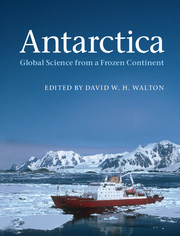Description
Antarctica
Global Science from a Frozen Continent
Coordinator: Walton David W. H.
A dramatically illustrated book, by leading international scientists, which describes Antarctica's central role in global scientific research.
Language: English
Subjects for Antarctica:
Publication date: 03-2013
352 p. · 19.3x25.3 cm · Hardback
352 p. · 19.3x25.3 cm · Hardback
Description
/li>Contents
/li>Biography
/li>
Antarctica is the coldest and driest continent on Earth ? a place for adventure and a key area for global science. Research conducted there has received increasing international attention due to concerns over destruction of the ozone layer and the problem of global warming and melting ice shelves. This dramatically illustrated new book brings together an international group of leading Antarctic scientists to explain why the Antarctic is so central to understanding the history and potential fate of our planet. It introduces the beauty of the world's greatest wilderness, its remarkable attributes and the global importance of the international science done there. Spanning topics from marine biology to space science this book is an accessible overview for anyone interested in the Antarctic and its science and governance. It provides a valuable summary for those involved in polar management and is an inspiration for the next generation of Antarctic researchers.
Introduction David Walton; 1. Discovering the unknown continent David Walton; 2. The continental jigsaw Brian Storey; 3. Ice with everything Valerie Masson-Delmotte; 4. Climate of extremes John Cassano; 5. Stormy and icy seas Eberhard Fahrbach; 6. Life in a cold environment Peter Convey, Angelika Brandt and Steve Nicol; 7. Space research from Antarctica Louis Lanzerotti and Alan Weatherwax; 8. Living and working in the cold Lou Sanson; 9. Scientists together on the ice Colin Summerhayes; 10. Managing the frozen commons Olav Orheim; 11. Antarctica and global change Alan Rodger; Appendix: visiting Antarctica; Appendix: further reading.
Professor David Walton began work in 1967 with the British Antarctic Survey (BAS). He is now an Emeritus Fellow at BAS, publishing papers and books on many aspects of Antarctica. Professor Walton represented the international Antarctic scientific community at Antarctic Treaty Meetings for 14 years and was awarded the first SCAR medal for International Scientific Coordination. He was also awarded a Polar Medal by the Queen. The author of more than 100 scientific papers, and more than 250 reviews, popular articles and reports, he has also written and edited several books and has been the editor in chief of the international journal Antarctic Science for the last 25 years.
© 2024 LAVOISIER S.A.S.




